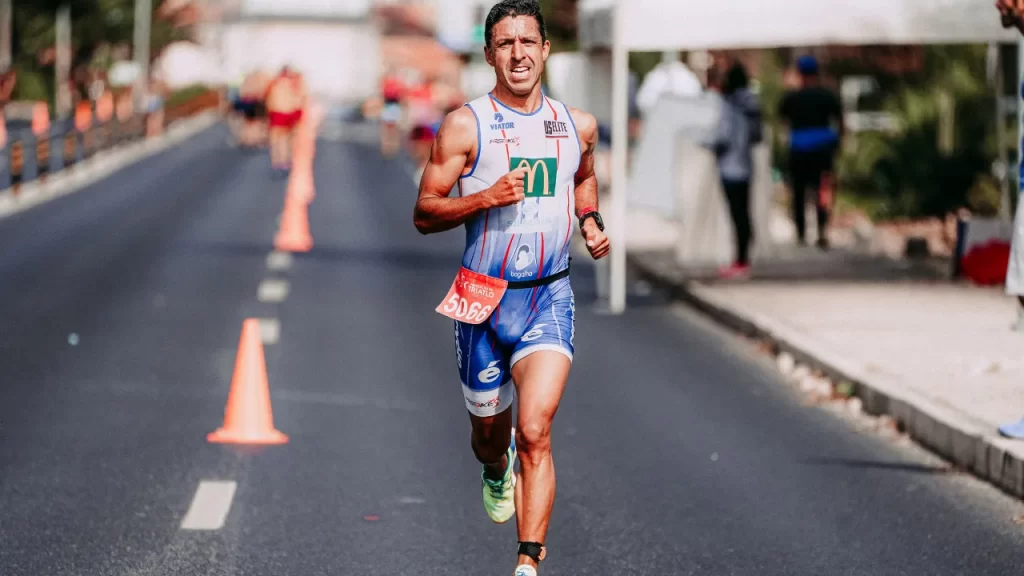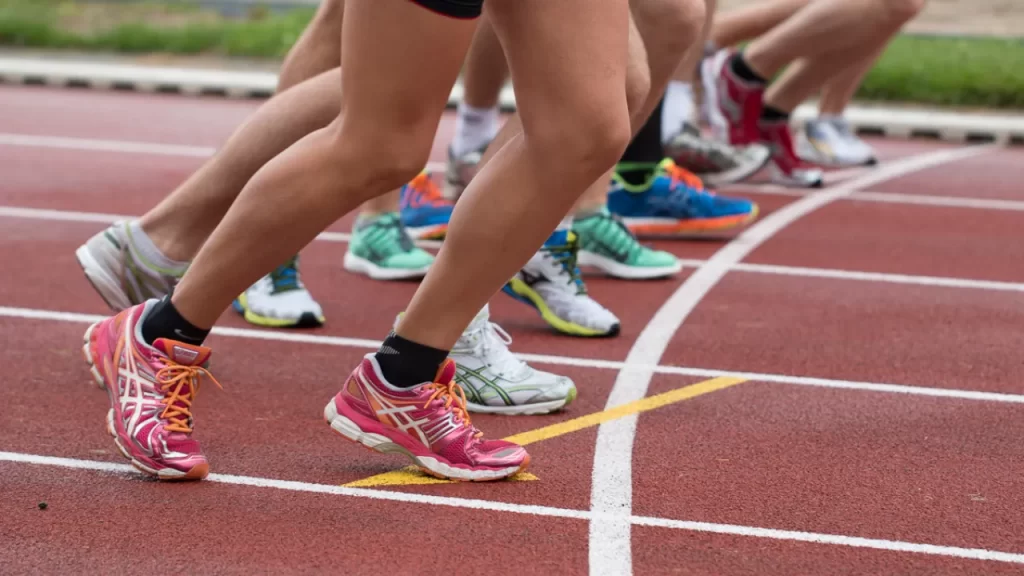Table of Contents
Curious about the average human running speed? Whether you’re jogging around the park or sprinting to catch a bus, running speed varies widely based on factors like age, gender, fitness, and distance.
What Defines Running Speed?
Running speed measures how fast you move, typically in miles per hour (mph) or kilometers per hour (km/h). Pace, on the other hand, tracks the time it takes to cover a distance, like minutes per mile or kilometer.
Average Speeds for Jogging

Jogging is a steady, relaxed run, often for exercise or leisure. The average human running speed for jogging differs by experience level:
- Beginners: 3.7–5 mph (6–8 km/h). New runners often start here, building stamina.
- Regular Runners: 5–6.2 mph (8–10 km/h). Consistent joggers hit this range with practice.
- Experienced Runners: 6.2–7.5 mph (10–12 km/h). Seasoned runners maintain this pace comfortably.
- Elite Runners: 10+ mph (16+ km/h). These athletes are far above the average.
For example, a beginner jogging a 5K might take 35 minutes, while an experienced runner could finish in 25 minutes.
Sprinting Speeds Uncovered
Sprinting is all about short bursts of maximum effort. The average human sprint speed is around 18.23 mph (29.33 km/h) across both sexes:
- Men: 19.52 mph (31.4 km/h). A typical 100-meter sprint takes 12–20 seconds.
- Women: 17.12 mph (27.55 km/h). They often complete a 100-meter sprint in a similar time range.
A middle-range 100-meter sprint time of 15 seconds equates to about 14.2 mph (24 km/h). Compare that to Usain Bolt’s record-breaking 27.78 mph (44.72 km/h) during his 9.58-second 100-meter run in 2009!
How Age Impacts Performance
Age plays a big role in the average human running speed. Sprint times slow down as we get older, especially for men in 100-meter races:
- 40–49 years: 11.26 seconds.
- 50–59 years: 11.88 seconds.
- 60–69 years: 12.76 seconds.
- 70–79 years: 14.34 seconds.
Younger runners, like Olympic sprinters averaging 26.2 years in 2016, tend to hit peak speeds. A 25-year-old might sprint faster than a 50-year-old due to muscle strength and recovery differences.
Gender Differences in Running
Men generally run faster than women, with a speed gap of 8.6% to 11% across distances. In 100-meter sprints, this widens to 14.2%:
- Men’s average running speed: 6.6 mph (10.62 km/h) for jogging, 19.52 mph for sprinting.
- Women’s average running speed: 5.7 mph (9.17 km/h) for jogging, 17.12 mph for sprinting.
Interestingly, women often maintain a steadier pace in marathons, helping them avoid fading late in races. For example, a woman might hold a 6 mph pace longer than a man in a 26.2-mile race.
Running Speeds by Distance

The average human running speed varies by race distance. Here’s a breakdown:
- 5K: Men average 29 minutes (6.37–8.75 mph), women 38 minutes (5.85–7.74 mph). Faster than 30 minutes puts you above 30% of runners.
- 10K: Men average 55 minutes (6.61–8.28 mph), women 1 hour 6 minutes (5.45–7.42 mph). The UK average is 58 minutes.
- Half Marathon: UK men average 1:55:26 (5.45–7.42 mph), women 2:11:57. The pace is around 9:22 min/mile.
- Marathon: Global average is 4:32:49. UK men average 4:23:27, women 5:00:39, with speeds of 5.11–6.99 mph.
A marathoner running 4 hours is moving at about 6.5 mph, while a 5K runner at 25 minutes hits 7.5 mph.
World-Class Running Achievements
Elite runners set the bar high. Notable records include:
- Fastest Mile: Hicham El Guerrouj (men, 3:43.13, 1999) and Faith Kipyegon (women, 4:07.64).
- Marathon Records: Kelvin Kiptum (men, 2:00:35, 2023) and Brigid Kosgei (women, 2:14:04, 2019).
- 100m Sprint: Usain Bolt (9.58 seconds, 27.78 mph) and Florence Griffith-Joyner (10.49 seconds, 21.3 mph).
Soccer star Kylian Mbappé has hit 23.6 mph (38 km/h) in matches, showing how athleticism crosses sports.
Factors That Shape Your Speed
Many elements affect the average human running speed. Key influences include:
- Fitness Level: Regular training boosts speed over time.
- Genetics: Muscle fiber types can give some runners an edge.
- Technique: Proper form, like good trunk control, improves efficiency.
- Terrain and Weather: Flat roads are faster than hilly trails or windy days.
- Nutrition and Hydration: Fueling properly supports performance.
For instance, a well-hydrated runner on a flat track will likely outpace a dehydrated one on a steep hill.
Measuring Your Own Speed
Want to test your average human running speed? Here’s how:
- Professional Tools: Electronic timing gates or GPS sensors offer precision to 0.01 seconds.
- At-Home Methods: Use smartphone apps with AI video analysis or a stopwatch with cones. Hand timing is often 0.24 seconds faster than electronic systems.
A runner using a stopwatch might clock a 15-second 100-meter sprint, feeling like a mini Usain Bolt, even if the time is slightly off.
Training to Boost Your Pace
Improving your average human running speed takes effort. Effective strategies include:
- Strength Training: Build explosive power with squats or lunges.
- Plyometrics: Jump exercises enhance reactive strength.
- Biomechanics: Focus on ground contact and posture.
- Progressive Training: Gradually increase speed and distance.
A beginner who starts jogging at 4 mph might hit 6 mph after months of consistent training.
Global Running Trends

Only about 9% of people worldwide run, per Strava data. In 2018, women (50.24%) slightly outnumbered men as runners, a historic shift. During COVID-19, average mile paces slowed by 8.5% from 2019, likely due to new runners joining in.
Average Mile Times Around the World
Strava data from August 2022 to July 2023 shows global mile times:
- Global Average: 10:25 (men: 10:02, women: 11:17).
- U.S. Average: 9:54 (men: 9:32, women: 10:37).
- UK Average: 9:48 min/mile (men: 9:19, women: 10:40).
These numbers reflect casual runners, not elites. A 10-minute mile translates to about 6 mph, a common jogging speed.
Could Humans Run Faster?
Scientists believe humans could theoretically reach 35–40 mph if muscle fibers contracted faster. Usain Bolt’s 27.78 mph is the current peak, but future training or genetic advances might push the average human running speed higher.
Final Thoughts
The average human running speed varies widely joggers hit 4.2–6.6 mph, sprinters reach 18–19 mph, and elites soar beyond 20 mph. By understanding factors like age, gender, distance, and training, you can set realistic goals and improve your own pace. Ready to lace up and test your speed?
FAQs
What is the average human running speed for jogging?
The average jogging speed is 6.6 mph (10.62 km/h) for men and 5.7 mph (9.17 km/h) for women, varying by fitness level.
How fast can the average person sprint?
The average sprint speed is 18.23 mph (29.33 km/h), with men at 19.52 mph (31.4 km/h) and women at 17.12 mph (27.55 km/h).
How does age affect running speed?
Sprint speeds decline with age. Men aged 40–49 average 11.26 seconds for 100m, while those 70–79 average 14.34 seconds.
Are men faster than women in running?
Yes, men run 8.6%–11% faster than women across distances, with a 14.2% gap in 100m sprints.
What’s the average 5K time for casual runners?
UK runners average 33 minutes for a 5K—29 minutes for men and 38 minutes for women.
How long does the average marathon take?
The global average marathon time is 4:32:49, with UK men at 4:23:27 and women at 5:00:39.
What factors influence running speed?
Fitness, genetics, technique, terrain, weather, nutrition, and hydration all impact running speed.
How can I measure my running speed at home?
Use smartphone apps with AI video analysis or a stopwatch with cones. Hand timing is 0.24 seconds faster than electronic.

